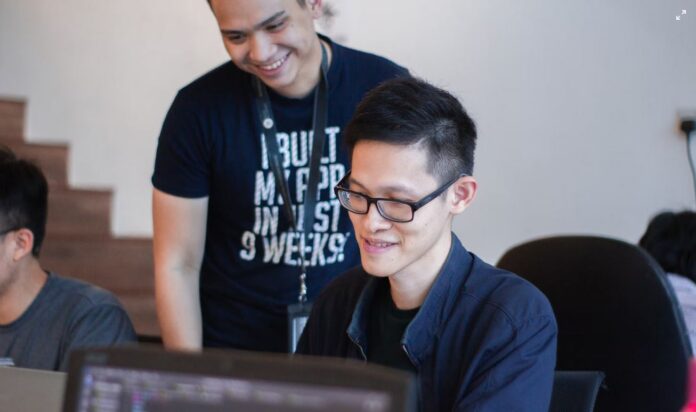By Dave Liu, AsAmNews Staff Writer
1. What is the value of a mentor and what is an ideal mentor for minorities and women?
I believe that the ideal way to learn the tactics to ascend the corporate ladder in any company is to have a mentor at work. Not a book, not a Youtube video, not even my blog! This is because companies are aggregations of individuals and each of us is different. The motivations and incentives necessary to drive behaviors are different. The tactics that will get your boss to promote you may be very different from the ones needed to get someone else promoted at another company. Unfortunately, there are no general tactics that will work in all companies.
As such, I believe the ideal solution is to find a mentor who is familiar with the culture of your firm and knows the best strategies to get what you want. They’ve stepped on the landmines and found the HOV lanes for promotion and compensation.
If you are a person of color or woman, the ideal mentor is someone who is the same gender and ethnicity as you because they’ve also dealt with the baggage that comes with not being the same as the group in power. If you are an Asian American woman, doing the leg work early in your career and scoping out the other Asian American women who have ascended your company will pay huge dividends in the future. They’ve dealt with the double whammy of the Model Minority Myth and misogyny and can give you pointers that they wish they had.
If you can’t find someone who looks like you, don’t despair. Early in my career, I had no Asian American leaders to emulate so I sought a mentor as high in the organization as possible. Fortunately, I convinced the CEO of our firm, who is a Caucasian man, to be my Yoda. He helped me in my career because he wanted me to succeed.
One final important practice that many young professionals fail to do is to treat mentors like doting parents. A parent wants to feel loved or at least have a child who is somewhat grateful. Be sure to show your gratitude. Keep your mentors apprised of your progress. Share your wins with them. Give them ownership in your career. Without this, that mentor may feel like they just wasted their time and may not answer your future calls for help
2. I don’t see many people who look like me in the executive ranks. What are easy things I can do to look the part of an executive?
Start with the basics like a wardrobe. If your company doesn’t have a dress code, then see what your executive wears. You don’t have to be a clone but if you work at a company where the executives wear suits and ties, leave your shorts at home and at least get a sports jacket. In Silicon Valley, hoodies, jeans, and Allbirds tend to be the uniform of choice so if you want to look like a techie executive be sure to emulate them.
Of course, this is form over substance. The best way to look the part of the executive is to actually do the part. After you’ve mastered your own job, try to take some work off your boss’s plate. Show that you have executive material by doing a great job with these projects. Before you know it, your bosses will start to imagine a world where you are part of their executive ranks.
However, before you do this, make sure you master your job. You can do your boss’s work, but never, ever make your boss do your work. Then it won’t matter how much you look like them. You will never be an executive in your company.
3. As an Asian American, how can I turn my perceived disadvantages into advantages?
No matter what disadvantage we have, I believe we all have superpowers—if we know how to use them. That power could be your gender, ethnicity, or simply one defining positive attribute. That’s all you need because when others take that attribute and associate it with everything else about you, it creates a halo effect. In hiring, this could be assuming a hot guy is also smart and a good hire, while an ugly fella is a schmo worthy of the ding pile. This bias—which is influenced by attractiveness, age, body type, race, and ethnicity, among others—is shown to disproportionately affect women and really hurts if you’re overweight.
To find your superpower and learn how to exploit it here are a few ideas:
- Confirm Their Positive Beliefs. Confirmation bias makes us focus on and remember things in a way that confirms our preconceptions. For example, Asian Americans are generally viewed as hard working. Even if you aren’t, you can leverage this positive belief because it means your bosses will give you the benefit of the doubt when you aren’t in the office working away at your cubicle.
- Neuter the Negative Ones. As an Asian American, I certainly used what I believed others already thought were my attributes, but also surprised them with other qualities. They already thought I was good at math, but maybe not aggressive enough. I fit the Model Minority Myth: obedient, hard-working, and darn good at figuring how much to tip the waiter. So I focused on areas where I knew they’d think I was deficient. I tried to be boisterous and affable. I brought creative ideas and not just STEM ones. I showed I could be the life of the party and come up with a great new pitch.
- Pick Your Battles. There will be times when you’ll want to go on the offensive and make a point. When you see someone do something inappropriate, fight. But you also need to learn when to grin and bear it. Don’t win the battle and lose the war.
- Change the Narrative. Your handicap may not be your gender, race, or physicality, but rather your hometown, your economic status, or even the firm you represent. But I learned early in my career that almost any disadvantage can be turned on its head if you’re willing to change the narrative. For instance, when I started my career I worked for a firm that was much smaller than our primary competition. So with client prospects I’d acknowledge my firm’s comparably tiny size but convince them we’d be scrappier and hungrier than the other firms. Change the story, change the outcome.
- Just Do It. People with disadvantages, disabilities, or handicaps are sometimes too afraid to try, but successful people try over and over again. So give it your all!
Dave Liu rose the ranks in the corporate world and now is a venture capitalist involved in some of the best companies in the world. He is also a cartoonist and author and has put his tips on navigating the work world in his new book, The Way of the Wall Street Warrior. AsAmNews receives a small commission from Book Shop if you purchase the book from the Link above.
AsAmNews has Asian America in its heart. We’re an all-volunteer effort of dedicated staff and interns. Check out our new Instagram account. Go to our Twitter feed and Facebook page for more content. Please consider interning, joining our staff, or submitting a story, or making a contribution.




